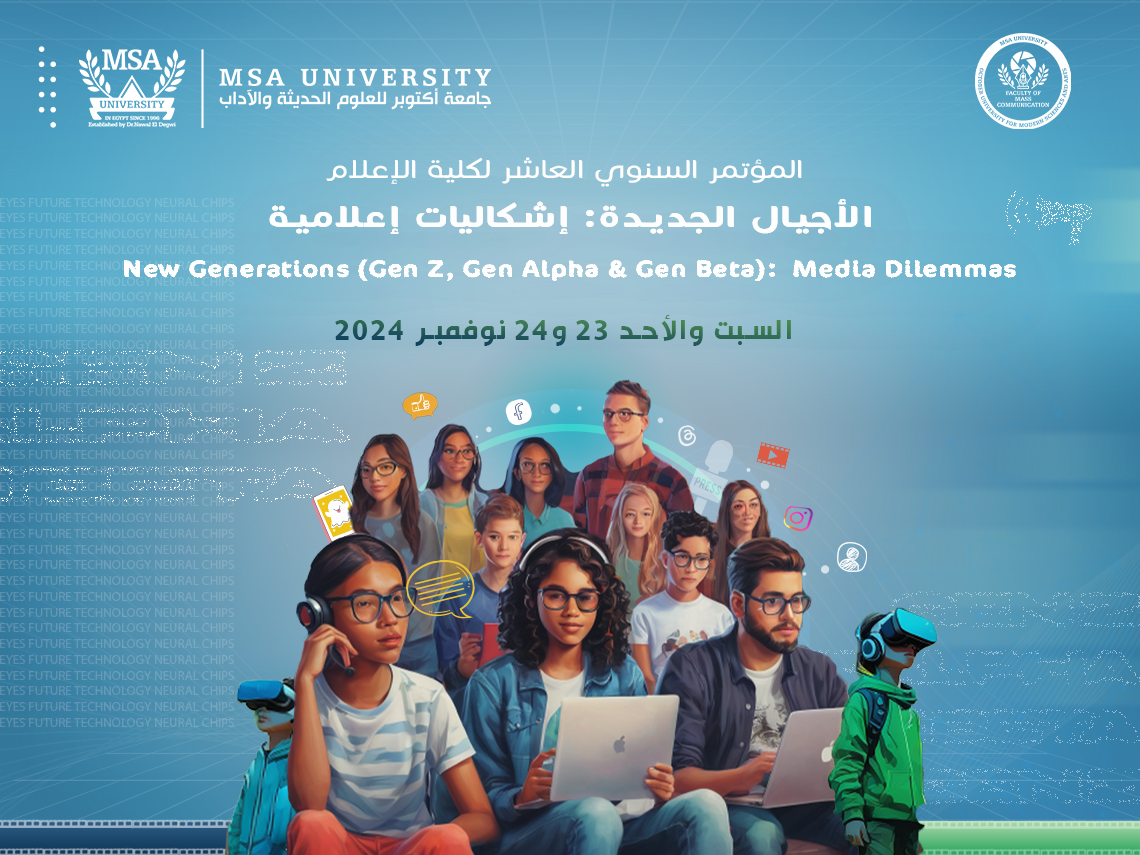The Faculty of Mass Communication at October University for Modern Sciences and Arts – MSA is pleased to announce its 10th Annual Conference “New Generations (Gen Z, Gen Alpha & Gen Beta): Media Dilemmas”, which will be held on November 23rd and 24th, 2024 at MSA Campus.
The conference aims to explore the relationship between the new generations and both digital and traditional media content, along with the subsequent professional, ethical, technological, social, and cultural dilemmas. This is particularly significant given the rapid and successive progress in digital media, including artificial intelligence (AI) technology, and the diverse and appealing content from multiple sources that may have an immense impact on future generations.
Furthermore, the conference seeks to forecast the trajectory of these generations, especially Generation Alpha, those born between 2011 and 2025, in terms of the expansive digital media landscape tailored to their consumption habits.
Conference Themes:
– The Characteristics of Digital Audience:
- The demographic, psychological, and behavioural analysis of the new generations.
- Patterns and exposure methods, prominent networks and platforms, alongside the role of parental supervision and guidance.
– Social and Cultural Dilemmas:
- The impact of digital media, including; digital platforms, social networking sites, and online video gaming, on the social and cultural identity of different segments of the new generations.
- Digital media and its role in cultivating concepts of; acceptance of others, coexistence, social integration, and non-discriminatory practices based on race, religion, or politics among the new generations.
- The role of content creators of the new generations in shaping societal values.
– Health Dilemmas:
- The impact of digital media on the mental health of the new generations, including issues such as; screen time exposure periods, cyberbullying, social comparisons, promotion of visuals linked to specific lifestyles or appearances, management of others’ impressions, and creating a distinctive virtual persona.
- The influence of digital media on the physical health of users from the new generations.
- Analysis of the health dialogue and the psychological discourse across digital platforms and their impact on the new generations.
– Digital Dilemmas:
- The skills and the strategies required for digital media education for the new generations and how to build a Digital Citizen capable of conscious and responsible use of digital media content.
- Digital Independence of the new generations and how they handle the concept of Privacy, as well as how they manage and protect their personal information to ensure Digital Security.
- The new generations and their ability to verify information in the age of Misinformation and Disinformation.
– Ethical Dilemmas:
- The strategies employed by media organisations and content creators to deliver successful & ethical media content that generates profit while ensuring the highest levels of viewership.
- Algorithmic manipulation, pushed feeds and their role in limiting the new generations’ opportunities to access diverse information, which contradicts the ethical codes of inclusion and transparency.
– Political Dilemmas:
- Political crises, regional and global conflicts through digital media, the political digital trends, and reactions of the new generations towards these conflicts.
- The dissonance between empathy, self-blame and self-protection, as well as the desire to understand, engage, and participate.
– Professional Dilemmas:
- The new generations and their perception of emerging concepts such as quick profit, career passion, entrepreneurship, digital content creation, and digital marketing as byproducts of the digital age.
- Children’s rights as content creators or as an element within content, where to draw the line between the invasion of kids’ privacy, for profit, and showcasing their talents and skills.
– Technical Dilemmas:
- Artificial Intelligence (AI) and Virtual Reality (VR) and their impact on the new generations, ranging from their ease of use to developing mental skills through diligence in research, problem solving and knowledge acquisition.
– Educational Dilemmas:
- The influence of digital media on the academic achievement of the new generations alongside the development of their cognitive and critical abilities.
- The role of digital media in acquiring skills and expanding the knowledge horizon of the new generations.
– Family Dilemmas:
- The role of parents in mitigating the negative impact of digital media on the new generations.
- Social media platforms and the parental right to share topics or images concerning their children.
- The impact of digital media on family relationships and intergenerational relationships, ranging from closeness and bonding to distancing and isolation.
- The perception of new generations regarding concepts such as; family and communal participation in light of discourse that emphasizes the value of individualism.
– Application Guidelines:
- The researcher (or each participating researcher) must fill out the registration form no later than June 15, 2024, via this link: https://forms.gle/RXsBKMS1FAQV8Ms8A.
- Accepted proposals through the registration form, must then be submitted as full paper via the email at rehams@msa.edu.eg no later than September 15, 2024.
- All research papers must adhere to the APA style for in-text citation and referencing.
- The research papers should not exceed 8000 words (30 pages).
- Submitted research papers for the conference will be peer-reviewed by specialized professors.
– Conference Registration Fees:
- (EGP)1800 for Egyptian Researchers.
- ($)550 for Non-Egyptian Researchers.
– Publication Guidelines:
- All accepted papers will be published in the Faculty of Mass Communication -MSA University- Academic Periodical (JMIS: Journal of Media & Interdisciplinary Studies) https://jmis.journals.ekb.eg/ .
- Researchers have the option of presenting a pre-reviewed paper (700 EGP for Egyptian researchers).
- Conference Coordinator: Assoc.Prof. Reham Sami rehams@msa.edu.eg
- Conference Head: Prof. Amany Fahmy

